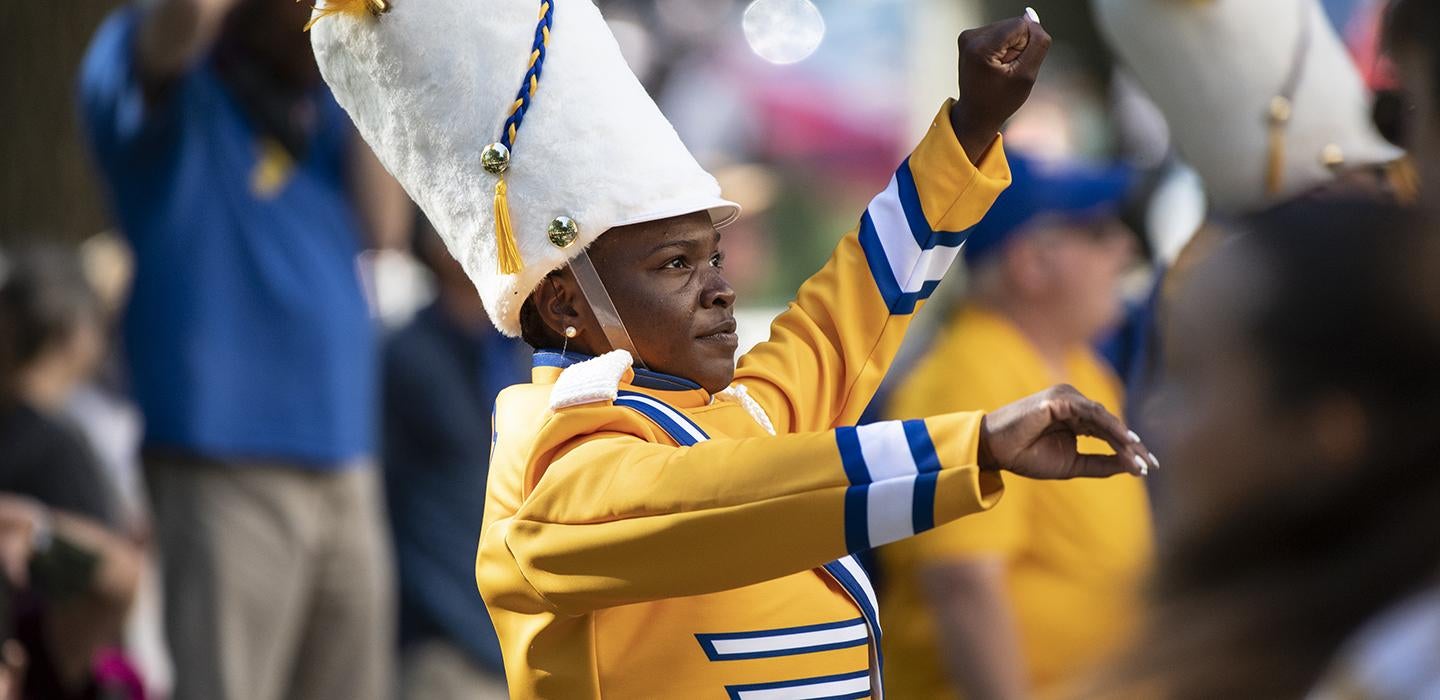
Subscribe to Pittwire Today
Get the most interesting and important stories from the University of Pittsburgh.Growing up in Savannah, Georgia, De'Jovia Davis was accustomed to southern traditions like comfort food, hospitality and regularly scheduled large family gatherings. But none left as significant an imprint on her life as the historically Black college and university (HBCU) band experience.
"Band culture is so important in the South, especially within HBCUs," said Davis, who was raised a few blocks from Savannah State University.
"As a kid, I could hear the band playing on my way to and from school. That vibe, the music, it hits your soul. With HBCU bands, it's not just a song or a rhythm; it's an electric feeling that goes through your entire body. You don't have to know anything about band or music, but when people talk about HBCUs, everybody, no matter their background, talks about the band."
Those experiences charted the course of Davis’ life.
"I was starstruck and knew band would be a part of who I was and what I was going to do with my future," she said.
In high school, the clarinet player kept busy, excelling academically and in cheerleading and track.
"Every year I'd say: 'I need to take something off my plate,' but band is what I kept coming back to," said Davis. "It's different than any other experience — you're working your body, your mind and learning how to work with others."
So it's no surprise that, when choosing a college, band was a significant factor for her.
"My high school schedule was really structured with practices, workouts and academics," she said. "I knew I'd need that same structure in college."
The third of four daughters sought to follow in her older sisters' footsteps by attending a large southern school or HBCU. However, none were the right fit.
"We all have to figure out what works best for us," said Davis, who credited her mom with helping her decide. "She went so hard in researching everything Pitt had to offer. She said, 'This is where you're going to be.' I talked more with her and many family members, and they all said the same thing: This is the place for you."
Without ever visiting campus, Davis chose Pitt with one certainty: "I wanted to be a part of the band."
Four years later, the urban studies major, Pitt Pathfinder, basketball manager and 2021 Spirit of Pitt Award recipient is the first Black female assistant drum major in the celebrated Pitt Band."My mom wanted me to find a place where I could thrive — Pitt was it," said Davis.
"De'Jovia was a natural choice to be one of our drum majors," said Pitt Band Director Brad Townsend. "From the time she came to us as a freshman, it was clear that she was special. She immersed herself in the culture of the band and demonstrated outstanding leadership qualities almost immediately. She has proven to be everything a drum major needs to be."
Women weren't part of Pitt Band until 1972, but individuals like Davis and her predecessor Crissy Shannon (A&S ’20), the first female head drum major, have made history.
"I was excited to follow in Crissy's footsteps," said Davis, who was Shannon's mentee in Kappa Kappa Psi, a service fraternity that promotes the advancement of bands. But only recently did Davis internalize the significance of her position.
"I was the first Black drum major at a predominantly white high school too, so I never really thought about it," she said. Excited whispers and photo requests by Black alumni and fans at Pitt games opened Davis' eyes. "It was in those moments that I realized how important it is to see Black representation in this space."
While Pitt and the surrounding communities aren't immune to racial challenges, Davis said she has found continued support.
"Is Pittsburgh the most diverse place in the world?" she posed. "Absolutely not. But I've loved all the opportunities I've been given here. I just wanted to get through and graduate when I was at home. Pitt was my first time meaningfully engaging with people of different ethnicities, and there's a greater diversity of opinion here. That doesn't mean every space was welcoming, but I'm grateful for spaces where I could speak and for uncomfortable situations because I was able to grow as a person."
Davis said she cherishes all she's gained.
"Pitt Band exceeded my expectations and has been the best part of my experience," she said. "The students are passionate about what they do, from performing to composing music. I love it."
As a Black student and woman, she challenged other future trailblazers to break barriers.
"We must continue to pave the way for others and continue putting ourselves in spaces where we — people of color and women — need more recognition," she said.
— Kara Henderson


